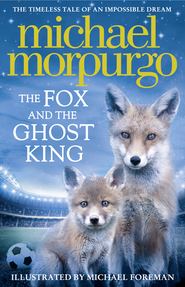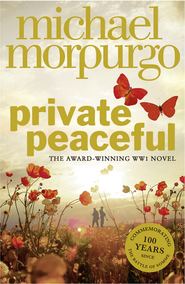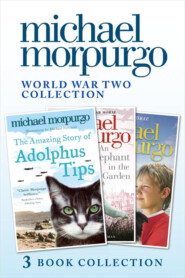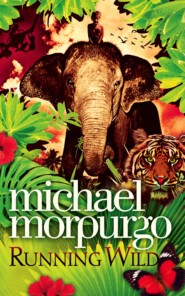По всем вопросам обращайтесь на: info@litportal.ru
(©) 2003-2024.
✖
Of Lions and Unicorns: A Lifetime of Tales from the Master Storyteller
Настройки чтения
Размер шрифта
Высота строк
Поля
I didn’t tell anyone at home, nor at school. Where I went on my bike, what I did, was my own business, no one else’s. Besides there was always the chance that Father would stop me – you never knew with him. And I certainly didn’t want any of my school friends oaring in on this. At least two of them knew all about horses, or they said they did, and I knew they would never stop telling me the right way to do this or that. Best just to keep everything to myself.
To get to the house the next day – you couldn’t see it from the road – I cycled up a long drive through high trees that whispered at me. I had to weave around the pot-holes, bump over sleeping policemen, but then came out on to a smooth tarmac lane where I could freewheel downhill and hear the comforting tic-a-tic of my wheels beneath me.
I nearly came off when I first saw them. Everywhere in amongst the trees there were animals, but none of them moved. They just looked at me. There were wild boar, dogs, horses and gigantic men running through trees like hunters. But all were as still as statues. They were statues. Then I saw the stables on my right, Peg looking out at me, ears pricked and shaking her mane. Beyond the stables was a long house of flint and brick with a tiled roof, and a clock tower with doves fluttering around it.
The stable block was deserted. I didn’t like to call out, so I opened the gate and went over to Peg and stroked her nose. That was when I noticed a pair of wellies waiting by the door, and slipped into one of them was a piece of paper. I took it out and read:
Hope these fit. Take her for a walk down the tracks, not in the fields. She can nibble the grass, but not too much. Then muck out the stables. Save what dry straw you can – it’s expensive. When you’ve done, shake out half a bale in her stable – you’ll find straw and hay in the barn. She has two slices of hay in her rack. Don’t forget to fill up the water buckets.
It was not signed.
Until then I had not given it a single thought, but I had never led a horse or ridden a horse in all my life. Come to that, I hadn’t mucked out a stable either. Peg had a halter on her already, and a rope hung from a hook beside the stable. I put the wellies on – they were only a little too big – clipped on the rope, opened the stable door and led her out, hoping, praying she would behave. I need not have worried. It was Peg that took me for a walk. I simply stopped whenever she did, let her nibble for a while, and then asked her gently if it wasn’t time to move on. She knew the way, up the track through the woods, past the running men and the wild boar, then forking off down past the ponds where a bronze water buffalo drank without ever moving his lips. White fish glided ghostly under the shadow of his nose. The path led upwards from there, past a hen house where a solitary goose stretched his neck, flapped his wings and honked at us. Peg stopped for a moment, lifted her nose and wrinkled it at the goose who began preening himself busily. After a while I found myself coming back to the stable-yard gate and Peg led me in. I tied her up in the yard and set about mucking out the stables.
I was emptying the wheelbarrow on to the muck heap when I felt someone behind me. I turned round. She was older than I remembered her, greyer in the face, and more frail. She was dressed in jeans and a rough sweater this time, and seemed to be covered in white powder, as if someone had thrown flour at her. Even her cheeks were smudged with it. She glowed when she smiled.
“Where’s there’s muck there’s money, that’s what they say,” she laughed; and then she shook her head. “Not true, I’m afraid, Bonnie. Where there’s muck, there’s magic. Now that’s true.” I wasn’t sure what she meant by that. “Horse muck,” she went on by way of explanation. “Best magic in the world for vegetables. I’ve got leeks in my garden longer than, longer than …” She looked around her. “Twice as long as your bicycle pump. All the soil asks is that we feed it with that stuff, and it’ll do anything we want it to. It’s like anything, Bonnie, you have to put in more than you take out. You want some tea when you’ve finished?”
“Yes please.”
“Come up to the house then. You can have your money.” She laughed at that. “Maybe there is money in muck after all.”
As I watched her walk away, a small yappy dog came bustling across the lawn, ran at her and sprang into her arms. She cradled him, put him over her shoulder and disappeared into the house.
I finished mucking out the stable as quickly as I could, shook out some fresh straw, filled up the water buckets and led Peg back in. I gave her a goodbye kiss on the nose and rode my bike up to the house.
I found her in the kitchen, cutting bread.
“I’ve got peanut butter or honey,” she said. I didn’t like either, but I didn’t say so.
“Honey,” I said. She carried the mugs of tea, and I carried the plate of sandwiches. I followed her out across a cobbled courtyard, accompanied by the yappy dog, down some steps and into a great glass building where there stood a gigantic white horse. The floor was covered in newspaper, and everywhere was crunchy underfoot with plaster. The shelves all around were full of sculpted heads and arms and legs and hands. A white sculpture of a dog stood guard over the plate of sandwiches and never even sniffed them. She sipped her tea between her hands and looked up at the giant horse. The horse looked just like Peg, only a lot bigger.
“It’s no good,” she sighed. “She needs a rider.” She turned to me suddenly. “You wouldn’t be the rider, would you?” she asked.
“I can’t ride.”
“You wouldn’t have to, not really. You’d just sit there, that’s all, and I’d sketch you.”
“What, now?”
“Why not? After tea be all right?”
And so I found myself sitting astride Peg that same afternoon in the stable yard. She was tied up by her rope, pulling contentedly at her hay net and paying no attention to us whatsoever. It felt strange up there, with Peg shifting warm underneath me. There was no saddle, and she asked me to hold the reins one-handed, loosely, to feel “I was part of the horse”. The worst of it was that I was hot, stifling hot, because she had dressed me up as an Arab. I had great swathes of cloth over and around my head and I was draped to my feet with a long heavy robe so that nothing could be seen of my jeans or sweater or wellies.
“I never told you my name, did I?” said the lady, sketching furiously on a huge pad. “That was rude of me. I’m Liza. When you come tomorrow, you can give me a hand making you if you like. I’m not as strong as I was, and I’m in a hurry to get on with this. You can mix the plaster for me. Would you like that?” Peg snorted and pawed the ground. “I’ll take that as a yes, shall I?” She laughed, and walked round behind the horse, turning the page of her sketch pad. “I want to do one more from this side and one from the front, then you can go home.”
Half an hour later when she let me down and unwrapped me, my bottom was stiff and sore.
“Can I see?” I asked her.
“I’ll show you tomorrow,” she said. “You will come, won’t you?” She knew I would, and I did.
I came every day after that to muck out the stables and to walk Peg, but what I looked forward to most – even more than being with Peg – was mixing up Liza’s plaster for her in the bucket, climbing the stepladder with it, watching her lay the strips of cloth dunked in the wet plaster over the frame of the rider, building me up from the iron skeleton of wire, to what looked at first like an Egyptian mummy, then a riding Arab at one with his horse, his robes shrouding him with mystery. I knew all the while it was me in that skeleton, me inside that mummy. I was the Arab sitting astride his horse looking out over the desert. She worked ceaselessly, and with such a fierce determination that I didn’t like to interrupt. We were joined together by a common, comfortable silence.
At the end of a month or so we stood back, the two of us, and looked up at the horse and rider, finished.
“Well,” said Liza, her hands on her hips. “What do you think, Bonnie?”
“I wish,” I whispered, touching the tail of the horse, “I just wish I could do it.”
“But you did do it, Bonnie,” she said and I felt her hand on my shoulder. “We did it together. I couldn’t have done it without you.” She was a little breathless as she spoke. “Without you, that horse would never have had a rider. I’d never have thought of it. Without you mixing my plaster, holding the bucket, I couldn’t have done it.” Her hand gripped me tighter. “Do you want to do one of your own?”
“I can’t.”
“Of course you can. But you have to look around you first, not just glance, but really look. You have to breathe it in, become a part of it, feel that you’re a part of it. You draw what you see, what you feel. Then you make what you’ve drawn. Use clay if you like, or do what I do and build up plaster over a wire frame. Then set to work with your chisel, just like I do, until it’s how you want it. If I can do it, you can do it. I tell you what. You can have a corner of my studio if you like, just so long as you don’t talk when I’m working. How’s that?”
So my joyous spring blossomed into a wonderful summer. After a while, I even dared to ride Peg bareback sometimes on the way back to the stable yard; and I never forgot what Liza told me. I looked about me. I listened. And the more I listened and the more I looked, the more I felt at home in this new world. I became a creature of the place. I belonged there as much as the wren that sang at me high on the vegetable garden wall, as much as the green dragonfly hovering over the pool by the water buffalo. I sketched Peg. I sketched Big Boy (I couldn’t sketch Chip – he just came out round). I bent my wire frames into shape and I began to build my first horse sculpture, layer on layer of strips of cloth dunked in plaster just like Liza did. I moulded them into shape on the frame, and when they dried I chipped away and sanded. But I was never happy with what I’d done.
All this time, Liza worked on beside me in the studio, and harder, faster, more intensely than ever. I helped her whenever she asked me too, mixing, holding the bucket for her, just as I had done before.
It was a Rising Christ, she said, Christ rising from the dead, his face strong, yet gentle too, immortal it seemed; but his body, vulnerable and mortal. From time to time she’d come over and look at my stumpy effort that looked as much like a dog as a horse to me, and she would walk round it nodding her approval. “Coming on, coming on,” she’d say. “Maybe just a little bit off here perhaps.” And she’d chisel away for a minute or two, and a neck or leg would come to sudden life.
I told her once, “It’s like magic.”
She thought for a moment, and said, “That’s exactly what it is, Bonnie. It’s a God-given thing, a God-given magic, and it’s not to be wasted. Don’t waste it, Bonnie. Don’t ever waste it.”
The horse and rider came back from the foundry, bronze now and magnificent. I marvelled at it. It stood outside her studio, and when it caught the red of the evening sun, I could scarcely take my eyes off it. But these days Liza seemed to tire more easily, and she would sit longer over her tea, gazing out at her horse and rider.
“I am so pleased with that, Bonnie,” she said, “so pleased we did it together.”
The Christ figure was finished and went off to the foundry a few weeks before I had to go on my summer holiday. “By the time you come back again,” said Liza, “it should be back. It’s going to hang above the door of the village church. Isn’t that nice? It’ll be there for ever. Well, not for ever. Nothing is for ever.”
The holiday was in Cornwall. We stayed where we always did, in Cadgwith, and I drew every day. I drew boats and gulls and lobster pots. I made sculptures with wet sand – sleeping giants, turtles, whales – and everyone thought I was mad not to go swimming and boating. The sun shone for fourteen days. I never had such a perfect holiday, even though I didn’t have my bike, or Peg or Liza with me.
My first day back, the day before school began, I cycled out to Liza’s place with my best boat drawing in a stiff envelope under my sweater. The stable yard was deserted. There were no horses in the fields. Peg wasn’t in her stable and I could find no one up at the house, no Liza, no yappy dog. I stopped in the village to ask but there was no one about. It was like a ghost village. Then the church bell began to ring. I leant my bike up against the churchyard wall and ran up the path. There was Liza’s Rising Christ glowing in the sun above the doorway, and inside they were singing hymns.
I crept in, lifting the latch carefully so that I wouldn’t be noticed. The hymn was just finishing. Everyone was sitting down and coughing. I managed to squeeze myself in at the end of a pew and sat down too. The church was packed. A choir in red robes and white surplices sat on either side of the altar. The vicar was taking off his glasses and putting them away. I looked everywhere for Liza’s wild white curls, but could not find her. It was difficult for me to see much over everyone’s heads. Besides, some people were wearing hats, so I presumed she was too and stopped looking for her. She’d be there somewhere.
The vicar began. “Today was to be a great day, a happy day for all of us. Liza was to unveil her Rising Christ above the south door. It was her gift to us, to all of us who live here, and to everyone who will come here to our church in the centuries to come. Well, as we all now know, there was no unveiling, because she wasn’t here to do it. On Monday evening last she watched her Rising Christ winched into place. She died the next day.”
I didn’t hear anything else he said. It was only then that I saw the coffin resting on trestles between the pulpit and the lectern, with a single wreath of white flowers laid on it, only then that I took in the awful truth.
I didn’t cry as the coffin passed right by me on its way out of the church. I suppose I was still trying to believe it. I stood and listened to the last prayers over the grave, numb inside, grieving as I had never grieved before, or since, but still not crying. I waited until almost everyone had gone and went over to the grave. A man was taking off his jacket and hanging it on the branch of a tree. He spat on his hands, rubbed them and picked up his spade. He saw me. “You family?” he said.
“Sort of,” I replied. I reached inside my sweater and pulled out the boat drawing from Cadgwith. “Can you put it in?” I asked. “It’s a drawing. It’s for Liza.”
“Course,” he said, and he took it from me. “She’d like that. Fine lady, she was. The things she did with her hands. Magic, pure magic.”
It was just before Christmas the same year that a cardboard tube arrived in the post, addressed to me. I opened it in the secrecy of my room. A rolled letter fell out, typed and very short.











